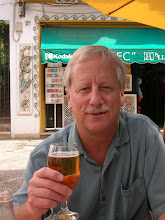To my many fans who have been asking where I have been, my only response is that I've been a bit distracted and disorganized. I was going to do a piece on the FCIC papers, but it is pretty complicated and I got interested in other things. My two favorite articles were by presenter number 9, Gary Gorton, and presenter number 7, whose name I don't recall. There was also a good paper on why too much government, especially Fannie and Freddie, did not cause the crisis, although they did exacerbate the effects. This has been a contention by those on the right from the beginning. It seems preposterous to me. If anything, there was too little regulation.
While playing golf with my buddies for a few days, I had some interesting discussions on issues. I wish I remembered more of what I learned. One good objection to government financing of elections that was raised was that you would have to include every nutball who registered as a candidate. Is this practical? The answer is no, in my opinion. With deficits going through the roof, I would prefer not to take on another taxpayer expense. I am afraid that the only realistic solution is a constitutional amendment to limit spending. I would limit corporations to zero.
Nobody could provide a good reason why the taxpayers paid 100 cents on the dollar on AIG credit default swaps. Lets hope the FCIC gets to the bottom of this.
I read a pretty funny article in the Atlantic by Chris Hitchens, but I am not in a religion-bashing mood, and won't be for the foreseeable future, so I am not providing a link. There was a couple good articles in the NY Review of Books, one on how children think and an adequate review of Margaret MacMillan's excellent book Dangerous Games; The Uses and Abuses of History. Micheal Lewis has an excerpt from his upcoming book in Vanity Fair. In the blogosphere, I definitely rate Marginal Revolution number 1 for day to day stuff, with Economist's View second. Some others are more specialty blogs and great in their own ways, like Daniel Little and Jonah Lehrer. (My blog links are at the bottom of the page.)
I tried to get started reading Charles Taylor's Sources of the Self, which attempts to show how modern identity arose, but it seems too difficult for me at the moment. I had done some reading in a Philosophy of Social Science textbook and am interested in the idea of humans as self-interpreting creatures, with implications for both the conduct of social science and the writing of history. But thinking about that has also stalled.
I did discover J.H. Elliott's Spain, Europe and the Wider World; 1500-1800, which is very good history so far, and have been dabbling in Tim Blanning's The Pursuit of Glory; The Five Revolutions That Made Modern Europe 1648-1815. Also read some good stuff in Lawrence Friedman's History of American Law (two books). But what has taken over my interest now is Strangers to Ourselves; Discovering the Adaptive Unconscious by Timothy B. Wilson. Perhaps I will write something about it at some point.
In addition to rising cholesterol and other physical impediments, getting older often makes it diffucult for me to concentrate on hard books for longer periods of time. But I gave up long ago on figuring out the world in any definitive sense, so I'm going with what I find interesting at the moment. It is also almost time for golf season, something else that I will never figure out. We are planning our spring trip to London, Florence and then driving around northern Italy, leaving for home from Venice. That will get me interested in history again.
This morning I had a court hearing for a fellow who got badly screwed by a workers comp insurance company and then later, the Social Security Administration. We won, so one good thing was accomplished today. Later, Tita and I will enjoy the new snow with a hike up Neff's Canyon and then I will check out the Blackhawks hockey game. We also have District 9 from Netflix, so we'll see how this best picture nominee fares. So far, my vote is for A Serious Man or Up In The Air. Yes, I've seen Avatar and The Hurt Locker and both were good in their own ways.
Addendum: I just read a really interesting article on Paul Krugman. Link here. It confirms why I think his op-ed pieces in the Times are not as good as his books or his blog; in the former he is dumbing down to influence politics. Personally, I prefer truth. But he is a great writer when he wants to be, and to the extent I have the ability to judge, a great economist. It is also an example of why the New Yorker is the best magazine; they have the best writers. My kudos especially to Malcolm Gladwell, John Cassidy and Steve Coll.
Subscribe to:
Post Comments (Atom)




No comments:
Post a Comment